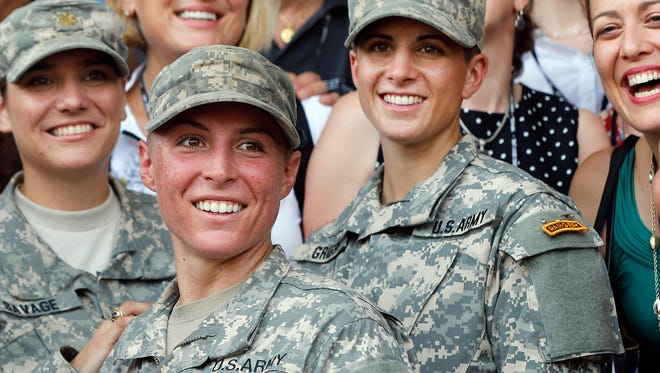Army wants more female recruiters
WASHINGTON — The Army needs more female recruiters over the next several years as it gears up for the end of the ban on women serving in tens of thousands of combat-related jobs, according to a top recruiting official.

Maj. Gen. Jeffrey Snow, in an Oct. 4 memo to the top Army personnel officer, has requested an annual boost in the percentage of women recruiters by 1% per year until 2018 "to improve the recruitment of females for Army service."
Women, Snow said, are 23% better at recruiting women than men. "Increasing the number of females on recruiting duty will improve the effectiveness of recruiting women," he wrote.
The request comes as the Pentagon moves to open all its frontline combat units, including special operations forces, to women by year's end. The services may request an exemption for a combat specialty if they can document that women cannot perform the required tasks. Thus far, no such waiver requests have been made public. However, the Marine Corps released a study last month showing that all-male units outperformed those that included women, suggesting that the service may seek a waiver for its ground combat forces.
Marine study finds all-male infantry units outperformed teams with women
"Regardless of the final decision, a number will be open," Snow said in an interview. "It's going to be important."
Snow, who leads the Army's recruiting command, also wants more female recruiters because they're underrepresented compared with the rest of the Army. Women make up about 9% of the Army's recruiters, while they are 15% of its nearly 500,000 soldiers.
"I am concerned that as a recruiting force I don't have the same number of women that exist out in the operational Army," Snow said.
The Army should be less concerned about the gender of its recruiters than policies that could make military careers more attractive to women, said Todd Harrison, a military budget expert at the Center for Strategic and International Studies. Expanded maternity leave and greater predictability in geographic moves are among the family-friendly policies that the Pentagon is studying, Harrison said.
"The bigger issue is not who you are using as the face of the recruiter but what are you offering women in terms of pay and benefits and quality of life," Harrison said.
Navy sweetens incentives like child care to keep its best sailors
The Army struggled to meet its quota of 59,000 recruits for the fiscal year that ended Sept. 30. Signing up more women will help meet its goal of 62,500 for the current year.
Young women make up 50% of those eligible to join the service, according to Snow.
Unless the Army seeks waivers for 13 combat specialties such as infantry and its elite Green Berets, tens of thousands of jobs will be open to women starting Jan. 1. Since 2012, the ban on women soldiers already has been lifted for 55,000 jobs, including combat engineers. Currently, 145,000 positions remain closed to women.
"As the Army expands (military occupational specialty) availability to women, a large, qualified and under-recruited segment of the population will become more available and likely more interested in service," Snow wrote. "The Army needs to provide more role models to assist in relaying Army opportunities to qualified females."